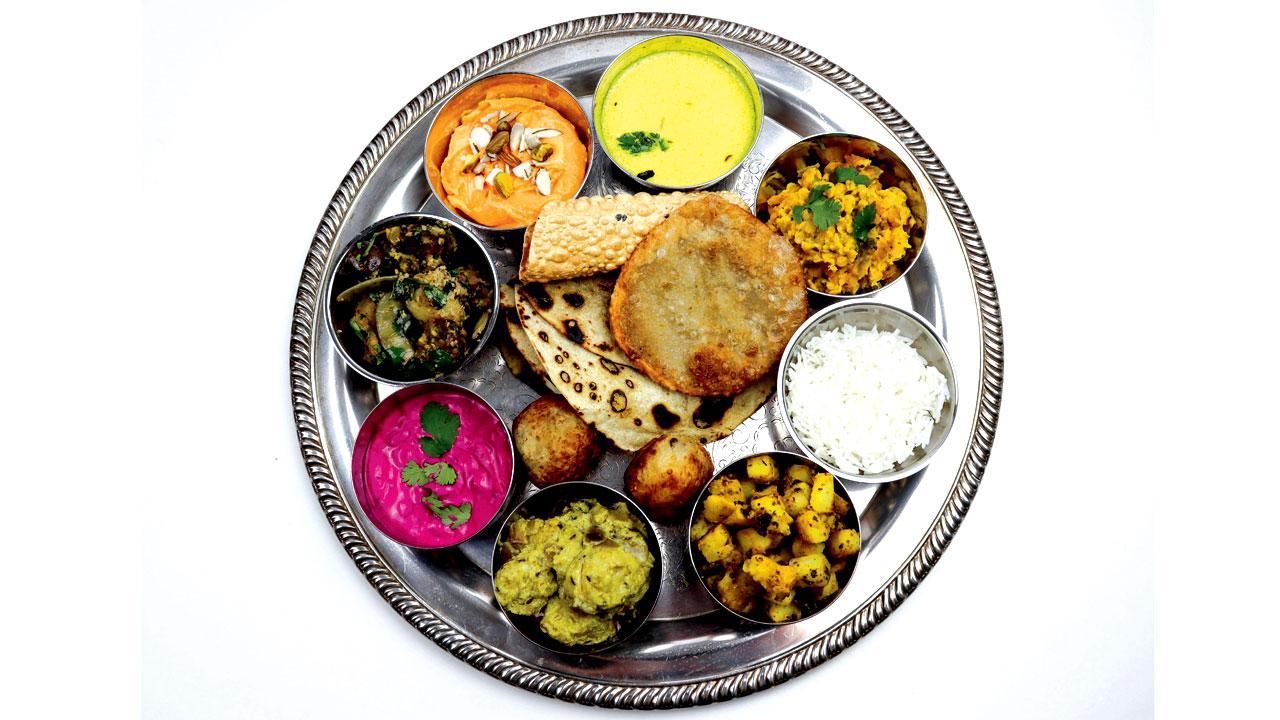A restaurateur from New Hampshire, who first fell in love with bhindi sabzi after visiting a desi grocery store, has collaborated with a Mumbai chef for a podcast to rekindle his relationship with Indian cooking

A Gujarati thali prepared by Sarasin, with daal, kadhi, undhiyu, aam shrikhand, batata nu shaak, paka kela ni bhaji, steamed rice and papad
If someone were to ask you about your earliest memory of an Indian spice, you’d probably have to jog your mind to when. Like, the first time you tasted haldi in khichdi, or sipped on elaichi chai, or enjoyed dal drenched in an aromatic tadka of rai and curry leaves.
Author-chef Keith Sarasin co-hosts More than Masala with Ragini Kashyap, where the two discuss the complex history of Indian spices. Pic Courtesy/Alisha Vasudev
“It’s not an easy memory to reclaim,” admits Mumbai-based Ragini Kashyap, food researcher and founder of multinational supper club, Third Culture Cooks. So, when American cookbook author and chef Keith Sarasin told her about that time from his late teens, when he walked into an Indian “dukaan” located in a small strip mall, and was overcome by the “intoxicating smell of toasted jeera,” Kashyap was more than amused.
“I grew up eating all these spices. But here was someone who hadn’t, and yet, distinctly remembered the backstory to each and every Indian spice he had first tasted,” she says.
This was the ice-breaker to a foodie conversation that eventually translated into a new podcast series, More Than Masala on Spotify, where the duo discuss the complex history of Indian spices, and the rich stories, folklore, warfare and cultural connections associated with them.
Sarasin met Kashyap almost serendipitously. The chef says that after 20 years of working nonstop in kitchens across the US, he decided to take a short break during the lockdown last year, selling his restaurant business to his partner. He used this time to turn his focus to Indian food. It’s how he found himself in a food and politics course hosted by Kashyap with Mumbai-based archaeologist and food historian Kurush F Dalal. Both, Dalal and Kashyap, he says, have helped him see Indian food with fresh eyes.
Growing up in a small city in New Hampshire, Sarasin had no exposure to Indian food. “But, I had an Indian friend whose family owned a restaurant there, and he’d always try to convince me to try a meal with him. I was a very picky eater, so I’d refuse point-blank.” Once, after having lost a video game challenge with him, he agreed. “That moment changed my life,” he recalls. The two went to a local restaurant, where Sarasin ordered a chicken tandoori gravy and garlic naan. “I ripped off a piece, dunked it into the sauce, and that first bite… it was like an explosion. I didn’t know that food could ever taste like that.”
Not too long after that, he visited an Indian grocery store and was surprised by what he saw on the racks. A Gujarati lady, named Indira, working in a kitchen at the back of the store, sensing his wonderment, got him to try what he describes as a “semolina sabzi”. The two immediately hit it off, and Sarasin, who started cooking as early as 14, convinced Indira to teach him to make Indian meals.
Also Read: Masala Bonds
“The first day I walked in, she had me make her rice, and halfway through it, she told me I was doing it all wrong. Indira’s food was very simple, but absolutely delicious. It was the soul that she put into it I think, that made it special. Her bhindi [sabzi] and masoor dal were to die for,” remembers Sarasin. He eventually began helping her out in her catering business, handling all the meat preparations. “I also started developing my Indian vocabulary, making sure that when I was in the kitchen with her, I only used the Hindi names of spices.”
A tamarind glaze vada-poha sabzi with beetroot dahi
During the lockdown, voraciously listening to Vikram Doctor’s The Real Food Podcast, he was led to one of the show’s guests, Dalal, who he says has now become his “guru” on all things food. His plans to visit India this year were cut short due to the pandemic. But, his new podcast show, he feels, is a good excuse to think about Indian cuisine differently. “Ragini is academic when it comes to her approach to food. We thought what if a fine-dining chef [like myself] collaborated on a project with her, where we could do a deep-dive into spices,” he says.
Each monthly episode addresses a different spice. At the end of it, Kashyap throws in a challenge for Sarasin, who has to prepare a dish using the spice as a key ingredient. One of his first challenges was to prepare sheermal, a mildly-sweet, saffron-flavoured naan. Recently, he made mooriyerachi curry, a Kerala-inspired Syrian Christian dish, using elaichi.
A farmers’ dinner hosted by Sarasin at a farm in New England
Meanwhile, Sarasin is hoping to use his learnings to introduce the diverse regional Indian food to Americans, whose knowledge of the cuisine, he says, is limited to butter chicken-naan. This month, along with chef Tarun Bangalore, he hosted a nine-course pop-up dinner called Aatma, inspired by Indian states, using fresh local ingredients from New England farms, at the restaurant Stages in Dover, New Hampshire. “I call it aatma [soul], because for me, this [Indian cooking] is my truest form of expression… it’s my true self.”
Also Read: Traditions in a pickle jar
 Subscribe today by clicking the link and stay updated with the latest news!" Click here!
Subscribe today by clicking the link and stay updated with the latest news!" Click here!









